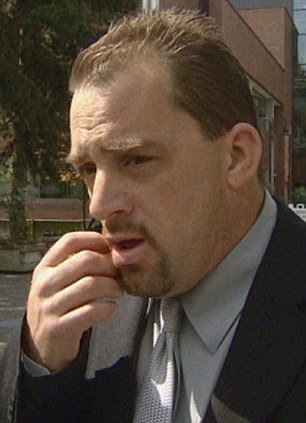We learned last week that a judge had sentenced Cory Sater--the drunkard whose monumental selfishness led him to drive without a licence, to drive while inebriated, to run over and kill Charlene Reaveley and Lorraine Cruz as they stopped to help someone at the side of the road along Lougheed Highway, and then to flee the scene of the accident--to 7 1/2 years in jail. So egregious was Sater's criminal actions that even a major newspaper in Great Britain reported on the sentencing.
The conclusion of this sad and terrible case reminded me of a column I wrote at the time of the killings--a column about one particular social scientist's repulsive ruminations about why the then-unknown motorist might, essentially, be excused for having fled the scene of his crime. Ultimately, of course, the sentencing judge had a completely different take on Sater's criminal responsibility. Here's that column from three years ago:
 |
| Convict Cory Sater. (DailyMail.co.uk) |
Does anyone other than a dwindling minority
of procrustean traditionalists recognize evil anymore—personal evil, that is?
Oh, sure, there’s plenty of the geopolitical variety to go around these days,
especially in North Africa. And there’s more than enough being identified on
the national stage by perpetually outraged critics within this country too, most
notably by those on the political left, who eagerly attach the E word [Evil!] to
everything from corporate profits and free trade to the oil sands and Prime
Minister Stephen Harper’s piano playing.
But we rarely hear about individual
Canadians doing “bad” things, exhibiting sinister behavior, acting wickedly, or
carrying on immorally, let alone sinning.
Instead, there’s always some sort of exculpating
explanation for bad behaviour. Shoplifters suffer from kleptomania; corrupt
officials have succumbed to stress or have manifested a previously undiagnosed
psychiatric disorder; prostitutes are victims of the patriarchy, poverty or
both; juvenile delinquents are the recipients of inadequate parenting; inner-city
gangsters are victims of racial discrimination; and thieves are impoverished or
addicted, and, if the latter, are surely not responsible for the burden of the
illness under which they are labouring. You get the picture.
Look at the website promoting the recent
Pink Shirt Day/anti-bullying campaign—a cause that should easily give rise to
descriptions of bullies acting wickedly, etc.—and you’ll see therapeutic
twaddle aplenty along with much vigorous exhortation to get to the root of the
problem, etc., but nothing about the plain and simple fact bullies are acting
immorally.
Which brings me to Exhibit A, otherwise
known as the spark that gave life to this particular column. You might have
heard of a horrible hit-and-run accident in Coquitlam, B.C., two weeks ago
which left two young women dead. In covering the aftermath of the crash, which
included the laying of several charges against a suspect, including two counts
of impaired driving causing death, a local newspaper turned to a clinical
psychologist from Simon Fraser University for some “insight” into “what might
lead someone to flee the scene” of a serious accident without giving help.
Dr. Joti Samra is quoted thusly: “Assuming
that it’s a true accident, the reality is… even from the perspective of the
person that caused the accident, it can be quite traumatic and cause an acute
stress reaction.” Got that? Acute stress
reaction.
The good doctor goes on to explain that the
brain could be flooded with information and emotion that would cause a person
to act unusually. “The fight or flight response is something we’re exposed to
when we are faced with extreme traumatic events,” Dr. Samra concludes. “Our
body kind of goes into a shock, it doesn’t know what to do.”
Notice the focus on the culprit’s body and
not his mind? I suppose it’s true that this human-as-hormonal-machine answer is
what you’d expect from a clinical psychologist, whose business, of course, is
to produce exactly this sort of pseudo-scientific analysis. But there’s no
excuse for the news media to limit their probing into human behaviour to “experts”
such as Dr. Samra. Why not someone with some grasp of the profundity of human
existence, someone like a novelist, a moral philosopher or a religious leader--
someone who recognizes we’re more than just pre-programmed biological machines?
To my mind, it would be a welcome
relief—and far more enlightening—to hear some real insights into moral character, the dark origins
of personal cowardice, or the nature of evil in circumstances such as these.
And so, for example, when asked why a driver might flee the scene of an
accident in which he had struck two innocent people, a priest might comment
that such a person had become alienated from God, had too easily succumbed to
temptation, and had become a sinner in need of redemption.
This would be really useful information as
far as I’m concerned, and might also help many readers reflect more deeply on
their responsibility—indeed, their duty—to act in a moral fashion.
But, of course, in this secular, humanistic
era of ours, we see very little serious discussion about evil in the public
square. Perversely, one is more likely to find scintillatingly descriptive
words, purring about the concept of evil, in advertisements attempting to
induce a consumer to indulge in some sort of deliciously sinful wickedness for
an affordable price. Moral inversion to sell chocolate pudding.
A recent full-page newspaper advertisement
for Volvo is a perfect example of this lamentable trend. Emblazoned above an
image of a shiny red S60 model, the ad copy informs us, “There’s more to life
than a Volvo. Like raising a little hell
with 300 horses, spanking corners
with your all-new sport-tuned chassis. And feeling
a little dangerous in a car tricked out with safety technology. That’s why
you drive the all-new naughty Volvo
S60.” (Emphasis added.)
A 16th-Century proverb holds,
“Evil doers are evil dreaders.” Today, however, evil doers are either the next
patient for the couch or a target market.



